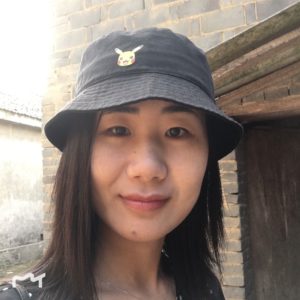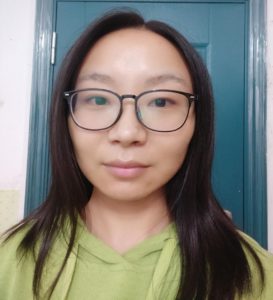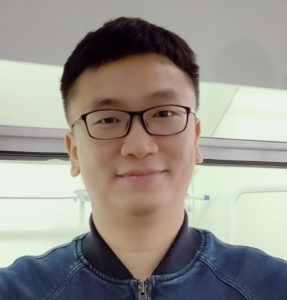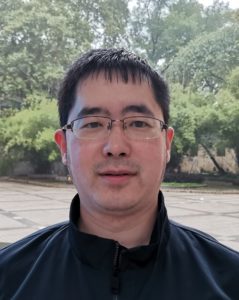Introducing the researchers:
 Ling Yang was born in 1991 in Qian Jiang, Hu Bei, China. In 2012 she received her bachelor’s degree in Chemical Engineering and Technology from Hubei University. After that, she obtained her Ph.D. degree in January 2018 under the supervision of Prof. Hua Jiang at the Institute of Chemistry, Chinese Academy of Sciences, working toward the synthesis and the characterization of aryl-triazole foldamer receptors to anion recognition. In 2018/2019, she worked as a postdoctoral fellow at Huazhong University of Science and Technology under the guidance of Prof. Quan Gan.
Ling Yang was born in 1991 in Qian Jiang, Hu Bei, China. In 2012 she received her bachelor’s degree in Chemical Engineering and Technology from Hubei University. After that, she obtained her Ph.D. degree in January 2018 under the supervision of Prof. Hua Jiang at the Institute of Chemistry, Chinese Academy of Sciences, working toward the synthesis and the characterization of aryl-triazole foldamer receptors to anion recognition. In 2018/2019, she worked as a postdoctoral fellow at Huazhong University of Science and Technology under the guidance of Prof. Quan Gan.
 Chunmiao Ma was born in Hubei, China. She received her bachelor’s degree in chemistry from China University of Geosciences, Wuhan in 2016. She is now working toward a Ph.D. under the supervision of Prof. Quan Gan at Huazhong University of Science & Technology, working on design, synthesis and characterization of artificial foldamers based on aromatic oligoamides.
Chunmiao Ma was born in Hubei, China. She received her bachelor’s degree in chemistry from China University of Geosciences, Wuhan in 2016. She is now working toward a Ph.D. under the supervision of Prof. Quan Gan at Huazhong University of Science & Technology, working on design, synthesis and characterization of artificial foldamers based on aromatic oligoamides.
 Dr. Brice Kauffmann is Crystallographer and head of IECB’s Biophysical and Structural Chemistry core facility. After a PhD in protein crystallography (2003, University of Nancy I), Brice Kauffmann spent three years at the European Molecular Biology Laboratory (EMBL) in Hamburg (Germany) working on the development of a new synchrotron beamline (X12, DESY). He joined the European Institute of Chemistry and Biology in January 2006 as a CNRS Scientist.
Dr. Brice Kauffmann is Crystallographer and head of IECB’s Biophysical and Structural Chemistry core facility. After a PhD in protein crystallography (2003, University of Nancy I), Brice Kauffmann spent three years at the European Molecular Biology Laboratory (EMBL) in Hamburg (Germany) working on the development of a new synchrotron beamline (X12, DESY). He joined the European Institute of Chemistry and Biology in January 2006 as a CNRS Scientist.
Dong yao Li was born in Xiangyang, Hubei, China. In 2015 he received his BS degree in chemistry at Hubei Normal University. He obtained his MS degree from Huazhong University of Science and Technology in 2017 under the supervision of Prof. Gan. and is currently working toward a Ph.D. in the same group, focusing on design, synthesis and applications of artificial foldamers based on aromatic oligoamides.
yao Li was born in Xiangyang, Hubei, China. In 2015 he received his BS degree in chemistry at Hubei Normal University. He obtained his MS degree from Huazhong University of Science and Technology in 2017 under the supervision of Prof. Gan. and is currently working toward a Ph.D. in the same group, focusing on design, synthesis and applications of artificial foldamers based on aromatic oligoamides.
Quan Gan was born in 1982 in Wuhan, China. He received bachelor’s degree and master’s degree in Organic Chemistry from Central China Normal University in 2005 and 2008. After that, he took part in a joint doctoral programme under the supervision of Prof. Hua Jiang at the Institute of Chemistry, Chinese Academy of Sciences and Dr. Ivan Huc at the European Institute of Chemistry and Biology, Bordeaux, working toward the synthesis and the characterization of aromatic foldamers to mimic the structures and functions of biomacromolecules, and received his Ph.D. degree in early 2013. In 2013/2014, he worked as a Marie Curie Postdoctoral Research Fellow at the University of Cambridge under the guidance of Prof. Jonathan Nitschke. He has been a Professor working on supramolecular chemistry at the Huazhong University of Science and Technology, China, since December 2014.
What inspired your research in this area?
The fantastic structures and functions of biomacromolecules always inspire our research.
What do you personally feel is the most interesting outcome of your study?
The hybridization of single helices of aromatic foldamers with full handedness control can give rise to the complete chiral control of double helices.
What directions are you planning to take with your research in future?
To explore the functions such as chiral sensors or catalysts is the aim that we focus on with foldamers. Here, the complete chiral control of aromatic helices offering a stable chiral environment within the cavity would provide chances to develop these functions, and which is currently being made in our laborotary.
Read the full article: Absolute handedness control of oligoamide double helices by chiral oxazolylaniline induction
See the other articles showcased in this month’s Editor’s Collection
See all the full articles on our publishing platform











